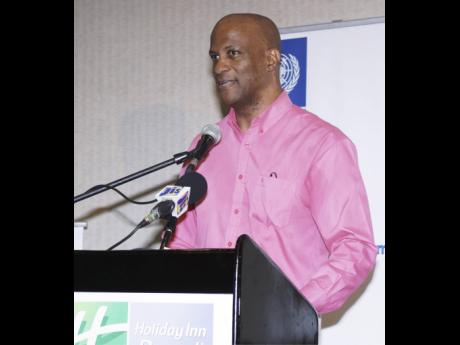We have a capacity challenge at our labs – NEPA
The National Environment and Planning Agency (NEPA) says repeated environmental breaches by local companies should not be viewed as lax enforcement on its part.
In fact, the state environmental watchdog said it is currently investigating 37 environmental breaches that have occurred in the last 12 to 18 months, of which three relate to pollution.
Speaking at a Gleaner Editor’s Forum on Wednesday, director of environmental management and conservation at NEPA, Anthony McKenzie, said the agency is also taking steps to improve its capacity to monitor and enforce environmental protection.
“We need to do more work in building compliance through awareness with our community stakeholders and citizens. When people are aware of the implications of what they do, then I think we have better responses and practices regarding our water sheds,” he said.
In addressing the latest breach by the Rusal-owned Windalco, which has been the “only entity” found to have repeatedly polluted the Rio Cobre, resulting in four fish kills in the last decade, McKenzie said the agency acknowledges that there have been recurring incidents of discharge into the river but noted that “major steps are being taken now to address that problem”.
“I wouldn’t say that there has been a breakdown in enforcement. When we deal with industries, there are always times when there are issues of upset. We have regulated over 350 domestic and industrial waste water treatment facilities, and the regulation and licensing of these plants are intended to control and minimise the impact of effluent on the environment and waterbodies,” McKenzie said.
The agency has also previously rejected the notion of revoking Windalco’s licence despite multiple infractions by the company and concluding that the bauxite company can take greater steps to reduce the likelihood of effluent discharges in the Rio Cobre.
CHALLENGES
NEPA’s ability to carry out its mandate is also affected by resource challenges, McKenzie said.
“We have to have the capacity to monitor these plants. We go to these plants and collect samples. We test to ensure they are meeting the standards. These plants are also required to report to us on the quality of their effluent. [But] 350 is a large number to monitor,” he said.
“We have a capacity challenge at our laboratories at the moment in terms of analysis of effluent samples but we are increasing that capacity. We have a programme to improve and expand on that capability,” the director noted
The agency would need more staff if it is to ramp up its investigations into breaches, the director further told The Gleaner following the Editors’ Forum.
In providing an update on the recent fish kill in Bridgeview in Portmore, St Catherine, McKenzie said the agency had not yet received the results of water-quality tests but that “based on the assessment so far, it is pointing to some contamination”.
The agency’s ability to stringently enforce and provide stronger deterrents to delinquent companies may also be hinged on the fact that it has been operating without clear legislation to support its work, as noted by a Caribbean Policy Research Institute (CaPRI) study.
In 2001, the three main regulatory bodies, the Natural Resources and Conservation Authority (NRCA), the Town and Country Planning Authority, and the Development and Land Development and Utilisation Commission were merged to create NEPA.
However, CaPRI revealed in 2018 that the act that established the NRCA was never repealed, and the new NEPA Act was never promulgated.
The Gleaner has learnt that the legislative amendments and promulgations have not been completed. However, Chief Executive Officer of NEPA, Pete Knight, while noting that the matter “is with the ministry?, was also unable to provide any greater clarity.
The Gleaner also tried to obtain an update through the Ministry of Economic Growth and Job Creation but did not receive a response up to press time.

